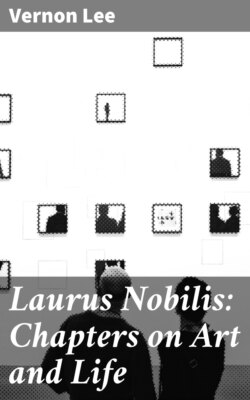Читать книгу Laurus Nobilis: Chapters on Art and Life - Vernon Lee - Страница 33
На сайте Литреса книга снята с продажи.
X.
ОглавлениеThe desire for beauty and harmony, therefore, in proportion as it becomes active and sensitive, explores into every detail, establishes comparisons between everything, judges, approves, and disapproves; and makes terrible and wholesome havoc not merely in our surroundings, but in our habits and in our lives. And very soon the mere thought of something ugly becomes enough to outweigh the actual presence of something beautiful. I was told last winter at San Remo, that the scent of the Parma violet can be distilled only by the oil of the flower being passed through a layer of pork fat; and since that revelation violet essence has lost much of the charm it possessed for me: the thought of the suet counterbalanced the reality of the perfume.
Now this violet essence, thus obtained, is symbolic of many of the apparently refined enjoyments of our life. We shall find that luxury and pomp, delightful sometimes in themselves, are distilled through a layer of coarse and repulsive labour by other folk; and the thought of the pork suet will spoil the smell of the violets. For the more dishes we have for dinner, the greater number of cooking-pots will have to be cleaned; the more carriages and horses we use, the more washing and grooming will result; the more crowded our rooms with furniture and nicknacks, the more dust will have to be removed; the more numerous and delicate our clothes, the more brushing and folding there will be; and the more purely ornamental our own existence, the less ornamental will be that of others.
There is a pensée of Pascal's to the effect that a fop carries on his person the evidence of the existence of so many people devoted to his service. This thought may be delightful to a fop; but it is not pleasant to a mind sensitive to beauty and hating the bare thought of ugliness: for while vanity takes pleasure in lack of harmony between oneself and one's neighbour, æsthetic feeling takes pleasure only in harmonious relations. The thought of the servile lives devoted to make our life more beautiful counterbalances the pleasure of the beauty; 'tis the eternal question of the violet essence and the pork suet. Now the habit of beauty, the æsthetic sense, becomes, as I said, more and more sensitive and vivacious; you cannot hide from it the knowledge of every sort of detail, you cannot prevent its noticing the ugly side, the ugly lining of certain pretty things. 'Tis a but weak and sleepy kind of æstheticism which "blinks and shuts its apprehension up" at your bidding, which looks another way discreetly, and discreetly refrains from all comparisons. The real æsthetic activity is an activity; it is one of the strongest and most imperious powers of human nature; it does not take orders, it only gives them. It is, when full grown, a kind of conscience of beautiful and ugly, analogous to the other conscience of right and wrong, and it is equally difficult to silence. If you can silence your æsthetic faculty and bid it be satisfied with the lesser beauty, the lesser harmony, instead of the greater, be sure that it is a very rudimentary kind of instinct; and that you are no more thoroughly æsthetic than if you could make your sense of right and wrong be blind and dumb at your convenience, you could be thoroughly moral.
Hence, the more æsthetic we become, the less we shall tolerate such modes of living as involve dull and dirty work for others, as involve the exclusion of others from the sort of life which we consider æsthetically tolerable. We shall require such houses and such habits as can be seen, and, what is inevitable in all æsthetical development, as can also be thought of, in all their details. We shall require a homogeneous impression of decorum and fitness from the lives of others as well as from our own, from what we actually see and from what we merely know: the imperious demand for beauty, for harmony will be applied no longer to our mere material properties, but to that other possession which is always with us and can never be taken from us, the images and feelings within our soul. Now, that other human beings should be drudging sordidly in order that we may be idle and showy means a thought, a vision, an emotion which do not get on in our mind in company with the sight of sunset and sea, the taste of mountain air and woodland freshness, the faces and forms of Florentine saints and Antique gods, the serene poignancy of great phrases of music. This is by no means all. Developing in æsthetic sensitiveness we grow to think of ourselves also, our own preferences, moods and attitudes, as more or less beautiful or ugly; the inner life falling under the same criticism as the outer one. We become aristocratic and epicurean about our desires and habits; we grow squeamish and impatient towards luxury, towards all kinds of monopoly and privilege on account of the mean attitude, the graceless gesture they involve on our own part.
